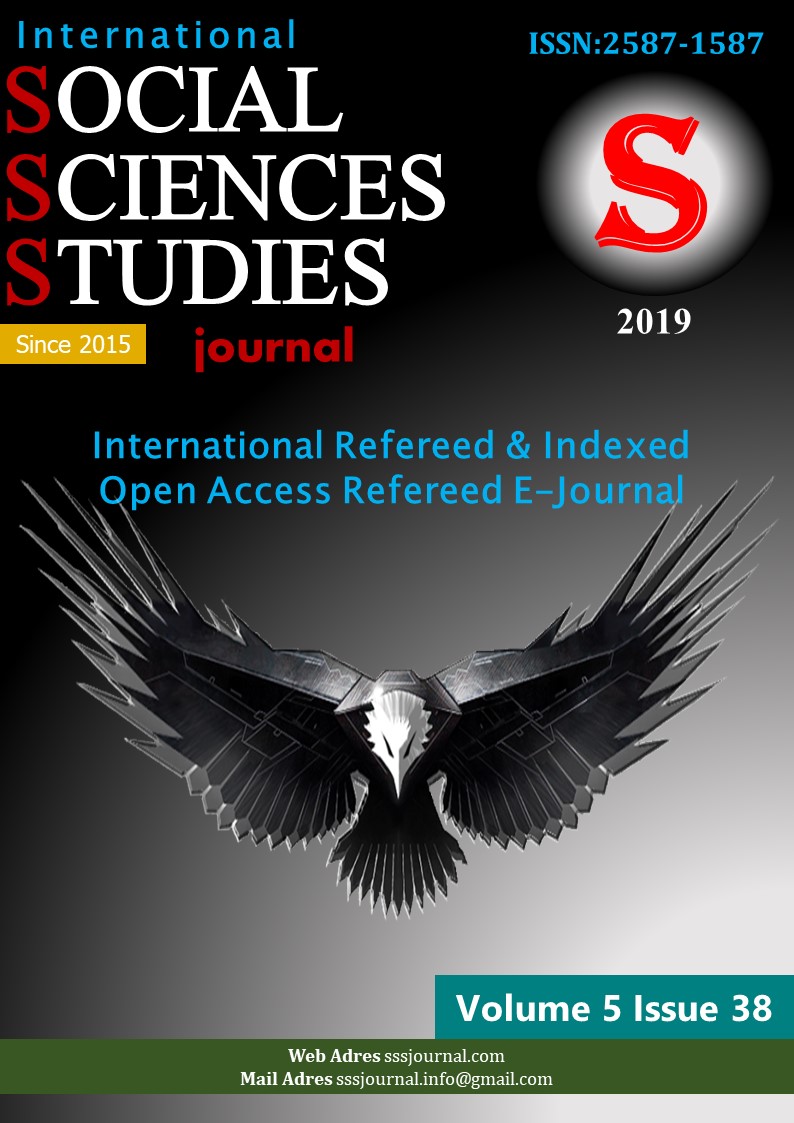Author :
Abstract
Kentlerin sağlıklı bir duruma getirilmesinde ve bu kentlerin gelecekte sürdürülebilirliğinin sağlanmasında kentlilik bilincine sahip olan aileler önemli unsurlardan biridir. Ailelerin kentte yaşamaları kentlerin büyümesi için yeterli olmamaktadır. Kentlilik bilincine sahip hane halkı hem niceliksel hem de niteliksel açıdan istenilen düzeyde bulunması çözüm bekleyen sorunlardandır. Bu sorunların bariz olanları ise göç alan kentlerin gereğinden fazla büyümesine, göç veren kentlerin de daha çok küçülmesine neden olmaktadır. Bu durum kent sosyolojisi, ekonomisini olumsuz bir açıdan etkilemektedir ve ülke ekonomisine bir maliyet olarak geri dönmesine sebebiyet vermektedir. Sağlıklı bir kentleşme ise ancak kente gelen göçmenlerin diğer gruplarla özdeş hale gelmeden onlarla bir bütünü oluşturacak şekilde etkileşimde bulunmaları halinde söz konusu olmaktadır. Bu çerçevede hane halkının göç etme eğilimlerinin araştırılması büyük önem arz etmektedir. Bu amaçla Şanlıurfa kentine göç eden hane halkının kenti algılama, kentsel farkındalık, kentsel kurumlara katılım, kenti sahiplenme, kent sorunlarına duyarlılık gibi kent ile bütünleşebilme süreçlerinde etkili olan mekanizmaları incelenmiştir. Çalışmada nicel araştırma metoduna başvurulmuştur. Araştırma kapsamında Şanlıurfa ilinde 20 mahallede ikamet eden 384 haneye anket yöntemi kullanılarak veriler elde edilmiştir. Anket çalışması sonrası elde edilen veriler SPSS ile değerlendirilmiştir. Uygulamadan elde edilen sonuca göre mahalleler sosyo-kültürel ve sosyo-ekonomik değişkenler açısından farklı gelişimler göstermiştir. Bu değişkenlerin bazılarında kırsal karakterini koruyan ve geldikleri bölgelerin özelliklerini yansıtan özellikler gösterirken, bazı değişkenlerde kentsel özellikler göstermektedir. Ancak değişkenlerin çoğunda kırsal ve kentsel yaşamın ikisinin de görüldüğü ve kırsal yaşamdan kentsel yaşama geçiş sürecinin devam ettiği belirlenmiştir.
Keywords
Abstract
Families who have the consciousness of urbanism are one of the important factors in bringing the cities to a healthy state and ensuring their sustainability in the future. Families living in cities are not sufficient enough for growth. The fact that urbanly conscious households are not at the desired level in aspect of both quantitatively and qualitatively is one of the problems awaiting solution. This situation affects urban sociology and economy in a negative way. In addition, it causes a great economic damage to the affected country. A healthy urbanization is only possible if the immigrants coming to the city interact with the other groups in a way that they form a whole without or before becoming identical with other groups. In this context, it is very important to investigate the migration tendency of households. For this purpose, the mechanisms that affect the integration process of households who migrated to Şanlıurfa city such as the perception of the city, urban awareness, participation in urban institutions, ownership of the city and sensitivity to urban problems were examined. We decided to use a quantitative research method in this study. Within the scope of the research, 384 households living in 20 neighborhoods in Şanlıurfa were surveyed. The data obtained after the survey was evaluated with SPSS. According to the results obtained from the application, the neighborhoods showed different developments in terms of socio-cultural and socio-economic aspect. While some of these variables exhibit characteristics that maintain the rural character and reflect the characteristics of the regions they come from, some variables show urban characteristics. However, in most of the variables both rural and urban life are seen and the transition from rural to urban life is continuing constantly
Keywords
- Acungil, Y. (2012). “Kentleşme Sürecinde Tokat'ta Kentlilik Bilinci”, Yayınlanmış Yüksek Lisans Tezi,
- Acungil, Y. (2012). “Kentleşme Sürecinde Tokat'ta Kentlilik Bilinci”, Yayınlanmış Yüksek Lisans Tezi, Gaziosmanpaşa Üniversitesi Sosyal Bilimler Enstitüsü, Tokat.
- Arı, O. (1982). “Türkiye’de Nüfus Hareketleri ve Gecekondular”, İstanbul Üniversitesi İktisat Fakültesi Mecmuası, 38(1-2), 3-24.
- Aydoğan, F. (1997). “Köyden Kente Göçün Ailenin Akrabalık ve Komşuluk İlişkileri Üzerine Etkileri, Toplum ve Göç” II. Ulusal Sosyoloji Kongresi, Ankara.
- Başel, H.(2003). “Sosyal Politika Açısından İç Göçler: Sivas’tan İstanbul’a Göç Örneği”, Yayınlanmış Doktora Tezi, İstanbul Üniversitesi Sosyal Bilimler Enstitüsü, İstanbul.
- Çelik, G. (2016). “Kentsel Bütünleşmede Yerel Yönetimlerin Uyguladığı Politikaların Rolü: Şanlıurfa Büyükşehir Belediyesi Örneği”, XIII. Kamu Yönetimi Kongresi Bildiri Kitabı, 15-17 Ekim, Konya.
- DPT (Devlet Planlama Teşkilatı), (1995). Yedinci Beş Yıllık Kalkınma Planı (1996-2000), Ankara. Eyyübiye Belediyesi, (2014). Eyyübiye Sosyal Yapı Araştırması, Kültür Yayınları, Şanlıurfa.
- Güçlü, S. (2002). Kentlileşme ve Göç Sürecinde Antalya’da Kent Kültürü ve Kentlilik Bilinci, T.C Kültür Bakanlığı Yayınları, Ankara.
- Güreşçi, E. (2012). “Türkiye’de Kırsal Göçün Aile Üzerine Etkisi”, Mustafa Kemal Üniversitesi Sosyal Bilimler Enstitüsü Dergisi, 9(17):149-161.
- İnsel, A. (2001). “İki Yoksulluk Tanımı ve Bir Öneri”, Toplum Ve Bilim Dergisi, (89):62-72. Kartal, S. Kemal (1978), Kentleşme ve İnsan, Todaie Yayınları, Ankara.
- Kıray, M.B. (1972). “Gecekondu-Az Gelişmiş Ülkelerde Hızla Topraktan Kopma Ve Kentle Bütünleşememe’’, A.Ü.S.B.F. Dergisi, 27(3):561-573.
- Kurt, H., (2003). Türkiye’de Kent-Köy Çelişkisi, Siyasal Kitabevi, Ankara.
- Özdemir, M. (2008). “Türkiye’de İçgöç Olgusu, Nedenleri Ve Çorlu Örneği”, Yayınlanmış Yüksek Lisans Tezi, Trakya Üniversitesi Sosyal Bilimler Enstitüsü, Edirne.
- Şahin, K. (2011). “Belediye Hizmetleri ve Hizmet Kalitesine Yönelik Vatandaş Memnuniyetinin Ölçümü(Konya İl Merkezi Örneği)”, Yayımlanmış Yüksek Lisans Tezi, Karamanoğlu Mehmetbey Üniversitesi Sosyal Bilimler Enstitüsü, Karaman.
- Şen, M. (2010). “Türkiye’de İç Göç Ve Sosyo-Ekonomik Uyum Süreci: İstanbul’daki TrabzonlularÖrneği”, Yayımlanmış Yüksek Lisans Tezi, Karadeniz Teknik Üniversitesi Sosyal Bilimler Enstitüsü, Trabzon.
- Şenses, F. (2001). Küreselleşmenin Öteki Yüzü, İletişim Yayınları, İstanbul.
- TUİK (Türkiye İstatistik Kurumu), (2014). Seçilmiş Göstergelerle Şanlıurfa 2013, Ankara. TUİK,Türkiye İstatistik Kurumu), http://www.tuik.gov.tr/(27.04.2019)
- Türkdoğan, O. (1971). Seçilmiş Bazı Yerli ve Göçmen Gruplar Üzerinde Sosyal Değişme Örnekleri, Atatürk Üniversitesi Basımevi, Erzurum.
- Vatandaş, C. (2008). Trabzon’da Kentleşme-Kentlileşme Süreci ve Problemleri, KTÜ Yayınları, Trabzon.





